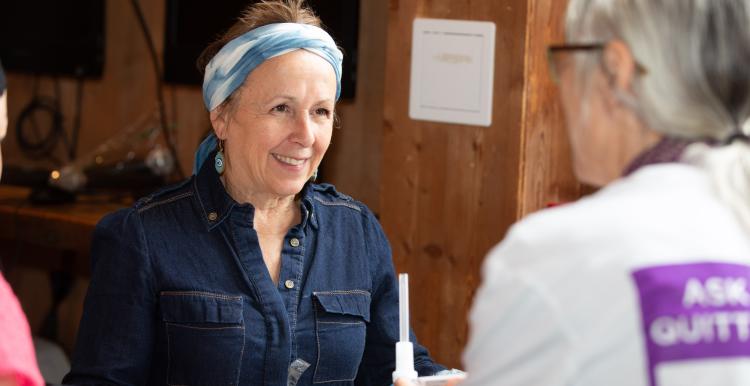Our annual report shows the value of listening

Today, we’ve launched our 2022-23 annual report, “The value of listening”. 2023 marked a decade since Healthwatch’s establishment – a decade that’s seen us empower millions of people to share their personal experiences of care.
In telling their stories, members of the public have demonstrated the power they have to show what is and isn’t working about our health and social care system. They have been pivotal not only in identifying the issues, but in highlighting how to make real and lasting change.
How your views have made a difference
See how your feedback has helped bring about important change to the health and social care system in our latest annual report.
It’s clearer than ever that it’s essential to listen to these voices to bring about better care for the nation. Only through listening to the public will we shape an NHS and social care system that works for everyone, for the next decade and beyond.
There are major challenges ahead for the NHS. In our report, we’ve highlighted concerns about the quality and safety of treatment. We’ve talked about the hidden problems and emerging worrying trends.
But we’ve also shared the work we’ve done to address those concerns.
- We highlighted key issues, from the impact of the soaring cost of living on people’s healthcare to the “hidden waiting list” created by delays to GP referrals.
- NHS England published a plan to improve care for Long Covid after people shared their stories with us.
- There were updates to the guidance for GPs on six-week post-natal checks after we revisited the issue of maternal mental health.
- The NHS ran a campaign around the NHS App and how it can help patients after we highlighted the need to increase confidence in the NHS.
- The NHS announced changes to their contract with dentists, after our data showed widening inequalities.
All of this was only possible because of the people who shared their stories with us – 384,615 people shared their experiences with Healthwatch nationally and locally.
By listening to those using health and social care services, commissioners and providers can more accurately identify and act upon the barriers to high‑quality care. They can build safer and more effective services around people’s needs, and in doing so also increase productivity and efficiency.
Overcoming the problems services face will take time, but there are three key areas that decision-makers for the health and social care system must focus on.
1. Making the NHS easier to access and navigate
People told us they felt administration and communication can be slow, inefficient and sometimes lacking in empathy. The NHS must demonstrate an ‘excellent customer service’ ethos, prioritising quicker access, clarity and simplicity at each touchpoint. Patients should also be able to access real-time information about their care, and have an informed, constructive dialogue with those responsible for their care.
2. Tackling health inequalities
Health inequalities in England are stark and growing. Those living in the most deprived areas can expect to live in good health for a far shorter time compared to those in the least deprived areas.
We want the NHS to provide excellent care for everyone. Differences in both life expectancy and life expectancy living in good health between the most and least well off should be falling by 2030. Integrated Care Systems should work with local authorities to ensure communities get the advice and support they need, and people with extra communication needs get full support every time they interact with the NHS.
3. Building a patient-centred culture
While the majority of patients told us they felt respected by healthcare professionals, we see that the quality of care people experience hugely varies. The NHS still has a culture focused on the priorities of the delivery system, rather than the needs and wishes of patients.
We must see a fundamental shift in the culture of the NHS so that there is a greater focus on listening to patients and acting on their experiences to be able to improve the care they receive – today and in the future.
If these three areas are left unaddressed, embedding a two-tier system is a real risk. A system where those with the means to do so increasingly turn to private healthcare, and those without the means are forced to wait. An NHS that no longer upholds the founding principles of universality, equitable and free care.
Those leading services can prevent this happening by working hand in hand with those they serve. By listening to patients, they can build a different kind of future for our health and care system. One where services recover from the pressures that have buffeted the system, and can offer everyone safe, high-quality, tailored care.
Healthwatch, both locally and nationally, will do all we can to help make this happen.
Want to know more about how care could be better? Our patient vision sets out where the NHS should focus to overcome the challenges it faces and put in place the support that people tell us they want.


